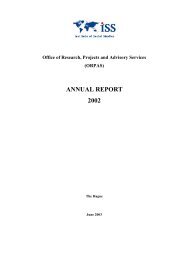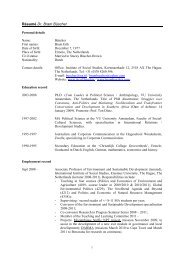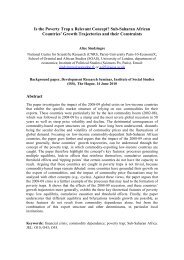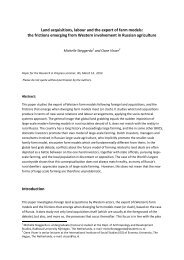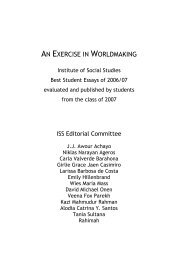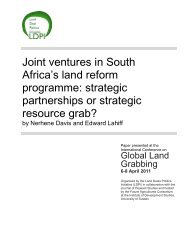AN EXERCISE IN WORLDMAKING 2009 - ISS
AN EXERCISE IN WORLDMAKING 2009 - ISS
AN EXERCISE IN WORLDMAKING 2009 - ISS
Create successful ePaper yourself
Turn your PDF publications into a flip-book with our unique Google optimized e-Paper software.
80 SABR<strong>IN</strong>A BR<strong>AN</strong>DT<br />
Trade liberalisation is referred to once, as leading to expanding exports<br />
(GoR op. cit.: 63) rather than imports (this may relate to liberalisation<br />
in the Southern Consensus, see Gore op. cit.: 797). Inflation is referred<br />
to as a problem for the future, but instead of defining a percentage<br />
goal of inflation, the report mentions that ‘double digit inflation<br />
will return to single digits in the coming years’ (ibid.: 129) by improving<br />
monetary policy but also by removing the bottlenecks for economic<br />
growth, which can be seen as a more alternative explanation. Further<br />
comments on monetary and fiscal policy are seemingly limited. The report<br />
does mention that the local fiscal capacities remain weak due to a<br />
lack of skills, so human resource development must take place before<br />
decentralisation in that aspect can continue (ibid.: 36) – an explanation<br />
that again can be rooted in the Southern consensus.<br />
Decentralisation is a dominant theme throughout the document,<br />
which could be related to Rwanda’s limited accomplishments in decentralisation<br />
in the past. Overall, the importance of macroeconomic stability<br />
is much emphasised.<br />
The Southern Experience<br />
What is interesting to mention here is that the main aim of the Rwandan<br />
government is a social transformation into a knowledge-based, technology-driven<br />
middle-income country by 2020 (GoR 2000, GoR 2007). As<br />
Sumner points out, this is the ‘point of arrival’ for the Latent South Consensus<br />
as well (op. cit.: 1405; see also Gore 2000: 796). It implies a long<br />
term development strategy, which is also a Southern approach to development.<br />
Especially one of the three flagship programmes of the EDPRSP –<br />
Sustainable Growth for Jobs and Exports – reflects some of Gore’s notions<br />
on development policy. First it is important to point out that the<br />
paradigm shift Gore refers to will mean a more analytical approach to<br />
development. In Rwanda’s EDPRSP this can be found in their growth<br />
diagnostic (GoR 2007: 49), which ranks the bottlenecks for growth. Interestingly,<br />
macroeconomic risks are given low priority whereas low human<br />
capital and skills and weak infrastructure are given a high priority.<br />
These are thus priorities in the flagship programme:<br />
[T]he right policies for growth should revolve around fostering human<br />
capital, business skills development and upgrading the infrastructure.<br />
(ibid.: 49).




